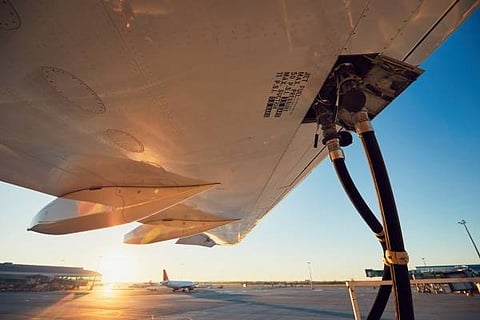
- News Updates
- PSU Watch
- Defence News
- Policy Watch
- हिन्दी न्यूज़
- Jobs Watch
- States News
- Event News

Reliance has sought access to ATF pipelines and storages built by PSUs
While PSUs are open to declaring new pipelines as common carriers, they have opposed opening captive ATF pipelines for common utilisation
Arguing that road transport is available for bulk transportation of ATF, Indian Oil said that competition already exists in the current market dynamics
New Delhi: As the old battle for Aviation Turbine Fuel (ATF) pipelines built by Public Sector Undertakings (PSUs) hots up, PSUs have claimed that ATF pipelines are not natural monopolies, unlike natural gas, which means that operating them as common carriers is not necessary for promoting competition in the jet fuel market. Reliance has sought access to ATF pipelines and storages built by PSUs over the years for supplying jet fuel from their refineries and depots to airports as it eyes a bigger share of the growth in jet fuel consumption in one of Asia’s biggest and fastest-growing aviation markets.
Reliance produces around a fourth of India’s ATF but exports most of it. It has written to the Petroleum and Natural Gas Regulatory Board (PNGRB) to seek access to storage depots outside the Delhi airport and ATF pipelines to Mumbai, Bengaluru and Hyderabad airports. Reliance has made these suggestions in response to a notice floated by the PNGRB in which it sought inputs from stakeholders on ATF supply in all existing and upcoming airports using common carrier pipelines to bring in competition and cut fuel cost.
While PSUs are open to declaring new pipelines as common carriers, they have opposed opening captive ATF pipelines for common utilisation. Indian Oil, which operates four captive/self-use ATF pipelines at Delhi, Chennai, Kolkata and Lucknow, told PNGRB, “It may be noted that captive/self-use ATF pipeline being operated were designed with the infrastructure of IOCL at both the ends and are out of the purview of PNGRB Act and its congruent Regulations.” Hindustan Petroleum Corporation Limited (HPCL), in its representation, said that declaring the existing ATF pipeline originating from their Mumbai Refinery will have an impact on refinery production and evacuation.
Pipelines originating from refineries, whether coastal or inland, up to a distance of around 300 kilometres from the refinery, and pipelines originating either from a refinery or from an oil company’s terminal dedicated to supplying products to a particular consumer are called captive pipelines.
The PSUs, however, suggested developing new pipelines as common carriers. “All major airports should be connected through at least one pipeline subject to its economic viability… In case of pipelines which are operating at more than 70 percent of capacity, PNGRB may initiate a process for inviting bids for a new pipeline to ensure redundancy and to mitigate the risk of dependency on a single pipeline,” said Bharat Petroleum Corporation Ltd (BPCL).
Arguing that road transport is available for bulk transportation of ATF, Indian Oil said that competition already exists in the current market dynamics. “It is understood that the ATF pipelines are not Natural Monopolies. Alternative modes of transport, ie, road, for bulk transportation of ATF to the Airport is available. It is not a case of Natural Gas pipelines where there is a Natural Monopoly, as natural gas cannot be transported on land by any other mode. Hence, the basic criterion for bringing in competition for ATF pipelines is totally different, and as per that ATF market dynamics, competition already exists in the market (sic.),” said IOCL.
The view was echoed by BPCL as well: “Needless to mention, most of the airports are situated within 50 km of the supply locations and road transportation can be undertaken to meet the demand in case of eventualities.”
Reliance has been seeking access to ATF pipelines and storage facilities built by PSUs for a long time now. It has argued that “the common carrier pipeline scope should encompass the associated storage facilities and pumping stations at the off-site oil terminal facilities as they form an integral part of the ATF supply chain.” “This will promote a competitive market for supply and distribution of ATF to the airport ‘on-site’ storage facilities,” it said.
In the past, for example, in the case of the Mumbai and Bengaluru airports, Reliance had expressed its inability to use road transport for ATF supply, citing clogged roads in both metro cities.
India’s total ATF production (both by public and private refiners) was 15 Million Tonnes (MT) in 2022-23. Out of this, 7.37 MT was consumed domestically, while the rest was exported. ATF consumption in India has been growing in double digits as the aviation market still has a lot of headroom to grow with more people being able to afford air travel. According to PNGRB’s analysis of the cost structure of the airline industry for the financial year 2021-22, aircraft fuel and oil comprised the highest share — 33.7 percent — of the total operating cost.
“Currently, ATF is transported via road and rail networks, with only a limited number of airports linked by ATF pipelines, resulting in logistical inefficiencies, increased expenses, and disruptions in the supply chain,” said PNGRB in its notice.
“… there are a few other ATF pipelines which are being operated by the OMCs, which also need to be declared as common/contract carrier. This move will enable other OMCs to utilise these pipelines for transporting their products, fostering competitiveness within the industry,” said PNGRB.
(PSU Watch– India's Business News centre that places the spotlight on PSUs, Bureaucracy, Defence and Public Policy is now on Google News. Click here to follow. Also, join PSU Watch Channel in your Telegram. You may also follow us on Twitter here and stay updated.)
